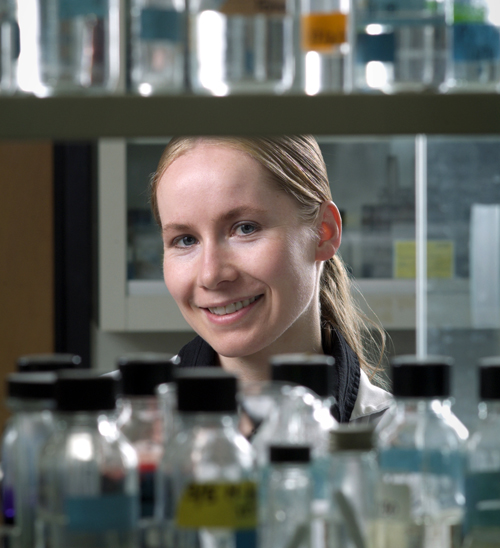
An Ontario Veterinary College virologist investigating the use of gene therapy to treat lung-related genetic diseases has been awarded a research grant from Cystic Fibrosis Canada.
Prof. Sarah Wootton, Pathobiology, will use the two-year $128,000 pilot grant to evaluate the effectiveness of using hybrid viruses to treat cystic fibrosis (CF). Wootton and post-doctoral fellow Jondavid DeJong plan to develop a baculovirus-adeno-associated virus (Bac/AAV) hybrid as the vector to deliver therapeutic genes to the lung.
Cystic fibrosis is a deadly hereditary disease that affects organs such as the lungs, liver, pancreas and intestines. It is caused by a mutation in a gene called the cystic fibrosis transmembrane conductance regulator (CFTR).
“CF is a good candidate for gene replacement therapy because it is caused by a mutation in a single gene, and it’s easy to reach the affected tissue in the lungs with inhaled vectors,” says Wootton.
The researchers chose to study a Bac/AAV hybrid for a number of reasons, particularly because both viruses are well understood and safe to use, and because a hybrid will be easy to produce in large amounts.
AAV infects people but is not associated with any illness and causes only a mild immune response. It is also site-specific and can be targeted to chromosome 19 where it harmlessly integrates into the host cell. The first gene therapy medication using an AAV platform was approved in Europe last year for the treatment of lipoprotein lipase deficiency, a rare metabolic disorder.
Baculoviruses have been used in the creation of vaccines for prostate cancer and certain types of human papillomavirus (HPV). An insect virus that cannot replicate in mammals, it has attracted the attention of gene therapy researchers, because it can easily be manipulated to deliver large amounts of genetic material to a wide variety of cell types.
Initially, Wootton’s team will study the effectiveness of the Bac/AAV vector on human and mouse lung cells in the lab, as well as in live mice. If the pilot study shows promise, they hope to move on to a large-animal model using pigs that have CF.
“We believe the Bac/AAV hybrid has a lot of promise, because it can be delivered efficiently to the cells where it will integrate into a specific area of the chromosome and promote long-term protein expression — replacing the mutant genes with properly functioning CFTR genes.”